Jul 09
Posted: under photography, Wildlife.
Tags: beauty, dragonfly, insect, odonates, photography July 9th, 2010
Today, after the rains of the past two weeks–and then a hot sunny midday–we had more species of odonates at the lily pond than I’ve seen yet this year. And the males all wanted a landing site on this stick: [...more]
Today, after the rains of the past two weeks–and then a hot sunny midday–we had more species of odonates at the lily pond than I’ve seen yet this year. And the males all wanted a landing site on this stick:
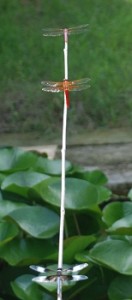 Read the rest of this entry »
Read the rest of this entry »

Jul 01
Posted: under photography, Plantlife, Water, Wildlife.
Tags: Animal behavior, beauty, dragonfly, insect, observation, odonates, photography July 1st, 2010
When I went out yesterday about noon, I found four of these lovely pink waterlily flowers open: [...more]
When I went out yesterday about noon, I found four of these lovely pink waterlily flowers open:
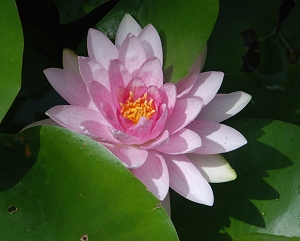 Read the rest of this entry »
Read the rest of this entry »

Apr 27
Posted: under photography, Wildlife.
Tags: Animal behavior, observation, odonates, photography April 27th, 2010
Back on April 20, I happened to see a dragonfly, just out of its nymphal exoskeleton, clinging to the stone border of the lily pond. An hour earlier and I could have photographed the whole sequence, but I have a partial sequence. [...more]
Back on April 20, I happened to see a dragonfly, just out of its nymphal exoskeleton, clinging to the stone border of the lily pond. An hour earlier and I could have photographed the whole sequence, but I have a partial sequence.
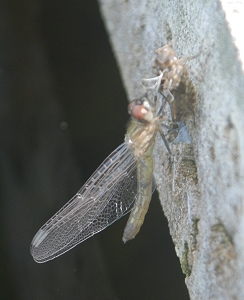 Read the rest of this entry »
Read the rest of this entry »

Nov 10
Posted: under photography, Plantlife, Water.
Tags: butterflies, native plants, odonates, photography, prairie restoration, water resource management November 10th, 2009
We have no permanent natural water on the place. But when it does rain, we have a variety of temporary water sources, from the actual creek to the various overflow channels (some of concern because of erosion; others now pretty much “tamed.”) [...more]
We have no permanent natural water on the place. But when it does rain, we have a variety of temporary water sources, from the actual creek to the various overflow channels (some of concern because of erosion; others now pretty much “tamed.”)
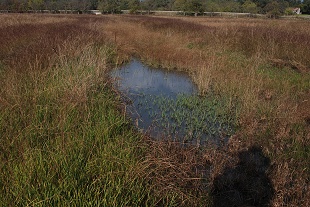
Read the rest of this entry »

Oct 27
Posted: under photography, Wildlife.
Tags: beauty, insect, native plants, natural water, odonates, photography October 27th, 2009
After the additional three inches of rain yesterday, the saturated ground is leaking water down every slope, making the grassland look like a marsh, or at least the margins of a marsh. [...more]
After the additional three inches of rain yesterday, the saturated ground is leaking water down every slope, making the grassland look like a marsh, or at least the margins of a marsh.
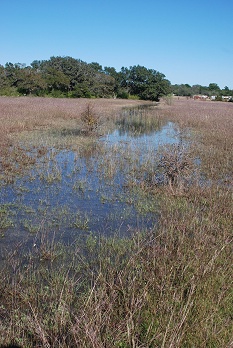 Read the rest of this entry »
Read the rest of this entry »

Jun 13
Posted: under Activities, photography, Wildlife.
Tags: Activities, beauty, documentation, identification, insect, odonates, photography June 13th, 2009
Besides the pretty pictures aspect (and I enjoy the pretty pictures, both taking them and seeing them online), photography has multiple uses that support wildlife and land management. For instance…I’m almost at the pond and a weakly-flying near-dragonfly-sized insect flies up and lands on the underside of a small limb. I can’t, with my eyesight, […] [...more]
Besides the pretty pictures aspect (and I enjoy the pretty pictures, both taking them and seeing them online), photography has multiple uses that support wildlife and land management. For instance…I’m almost at the pond and a weakly-flying near-dragonfly-sized insect flies up and lands on the underside of a small limb. I can’t, with my eyesight, see it clearly. I know it’s not a dragonfly, butterfly, or moth, but what is it? If I get too close it will fly away.
Enter the camera with a zoom lens:
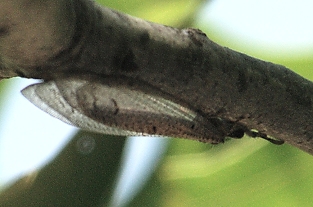 Read the rest of this entry »
Read the rest of this entry »

Mar 18
Posted: under photography, Wildlife.
Tags: Animal behavior, observation, odonates, photography March 18th, 2009
The first odes of spring showed up after the rain, not surprisingly: the first was a tiny Citrine Forktail male seen flying from one (too brief to grab a shot) perch on dead week stalks sticking out of water, late Sunday. On Tuesday evening, behind the #3 gabion, I spotted three pairs of Plateau Spreadwings*, […] [...more]
The first odes of spring showed up after the rain, not surprisingly: the first was a tiny Citrine Forktail male seen flying from one (too brief to grab a shot) perch on dead week stalks sticking out of water, late Sunday. On Tuesday evening, behind the #3 gabion, I spotted three pairs of Plateau Spreadwings*, Lestes alacer, all trying to oviposit on one tiny clump of Eleocharis…the only clump that had greened up.
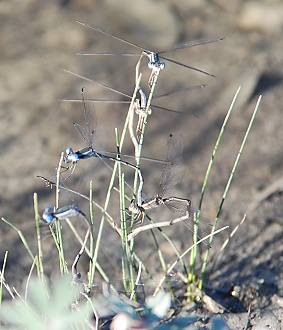
Spreadwing Damselflies ovipositing
The third female is out of sight behind that blurred leaf at the bottom (you can just see one eye and a few segments of abdomen.) The males have bright blue eyes and a pale blue or pale green stripe on the thorax; the females are shades of brown/tan/beige.
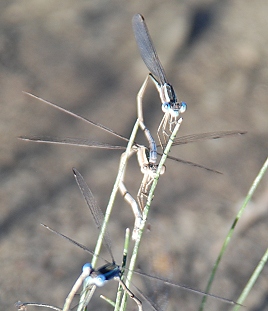
The male holds on while the female makes a slit in the stem of the plant and inserts eggs. These stems are so thin it’s hard to imagine any room for eggs inside, but after the long drought, no water plants with thicker stems had emerged from last week’s rain. Only this single little clump. Unfortunately, we’re not expecting any rain, and it’s already warm–the little rain pool behind the picture is already drying up/sinking into the soil.
I spotted a male Common Bluet at another rain pool, but the pictures weren’t clear enough to post.
*EDITED: The spreadwings were IDed as Plateau Spreadwings by Dennis Paulson, from the TexOdes list, via email. Thanks!









